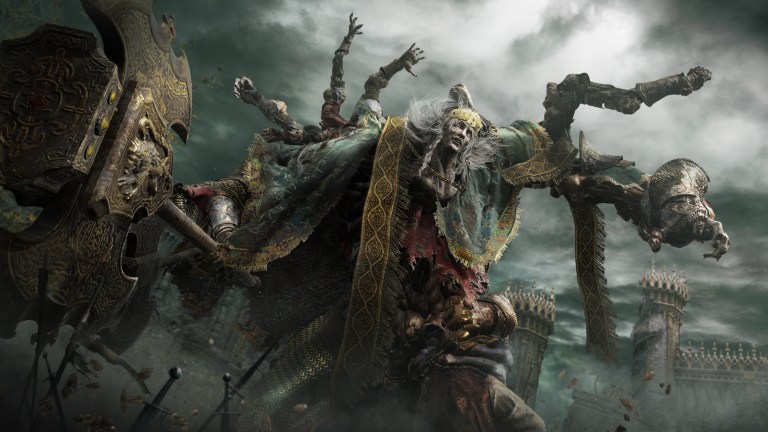Elden Ring: Why the Hunt For the Game’s Lore Is About More Than Answers
For some gamers, the journey is more important than the destination in the hunt for Elden Ring’s lore.

At E3 2019, developer FromSoftware released a teaser trailer for Elden Ring, an action role-playing game from Dark Souls director Hidetaka Miyazaki and Game of Thrones creator George R.R. Martin. FromSoftware didn’t post another Elden Ring trailer until June 2021. During the long wait, things got weird.
“As the months passed, it became clear that we weren’t getting Elden Ring [anytime soon],” says Sean of the YouTube channel The Lore Hunter. “In fall 2019, fans decided that, if FromSoftware wasn’t saying anything, they’d make Elden Ring for themselves.”
For the next two years, Elden Ring fans turned the open-world RPG’s two-and-a-half-minute teaser trailer into a communal compendium of lore that fleshed out the game’s world, characters, and story – but a lot of it was made up. Since a single teaser trailer isn’t usually enough to get a full grasp on a game’s narrative, most of the “lore” collected by fans was based on nothing more than running jokes and wild guesses. What began as a legitimate attempt to dissect the trailer soon morphed into elaborate backstories for fictional characters like Glaive Master Hodir as well as deep dives into fabricated plot points like Filoche helping King Dramt swallow the sun. Before long, the now-famous trailer line “Oh! Elden Ring” became a rallying cry used to lament the lack of official updates and celebrate the madness that was unfolding.
It’s not unusual for fans to obsess over fantasy lore, but it is unusual for people to be so obsessed with a teaser trailer for a new video game that they decide to just make up their own stories and characters while they wait for the next one. What would possibly inspire so many fans to spend years creating elaborate mythology for a game they knew almost nothing about?
“I’d say the names ‘Hidetaka Miyazaki and George R.R. Martin’ probably did it!” theorizes Sophie Pilbeam of Sinclair Lore. “They’re authors we’re familiar enough with that we can make educated guesses about what they’d probably do, but they aren’t beholden to one style.”
FromSoftware games have always invited this level of speculation and theorizing. Unlike many fantasy works that offer definitive mythologies, the stories in Miyazaki games are usually open to interpretation, puzzles players are left to piece together themselves. These lore hunters just got a head start.
FromSoftware finally released new footage, screenshots, and even plot details for Elden Ring in 2021. The fan fiction had been shattered, but the community remained strong. They knew the real work had just begun. It was time to abandon the “meme lore” and try to start making sense of what Elden Ring was really about.
“My foundation for interpreting pre-release lore comes from trailer dialogue and interviews,” Sean explains. “I’ll zoom in 200% on an image or go frame by frame through a trailer and see if any of it relates back to something that has been stated by a primary source. It’s the dorkiest thing in the world, but FromSoftware is so detail-oriented and expresses so much visually that even months after an image comes out, I still find new discoveries.”
It’s easy to assume that someone would only spend so much time studying a game world in order to find definitive answers. However, Elden Ring fans are often more interested in the process of “connecting the dots until you’re forced to speculate a little bit to form a conclusion,” according to Sean.
While there are many who rely on lore explainers to better understand games like Elden Ring, some lore hunters suggest that the beauty of those games is that they can be enjoyed no matter how well you understand their mythologies.
“The games continue to resonate with a broad audience because there are multiple ways to engage with them,” Pilbeam says. “I have friends in the community who are absolutely in love with the story and characters, but almost didn’t pick up the games to start with because the ‘hardcore’ discourse put them off. I think that the stories presented in the games recontextualize the difficulty to be about the characters being vulnerable, isolated, and overwhelmed, rather than them proving they’re stronger than other people.”
Interpreting Elden Ring’s lore isn’t about gatekeeping but appreciating how these games encourage people to stop looking for a definitive experience and instead learn to love sharing their own journey.
“[They’re] the ultimate watercooler games because everyone brings something different to the table,” Sean explains. “You get a mixture of shared and unique gameplay experiences and similar and differing interpretations of the story and lore… It’s a chance to experience challenge and mystery again, and the joy of coming together as a community and learning about others’ experiences and interpretations.”
Elden Ring is scheduled to be released on February 25.
